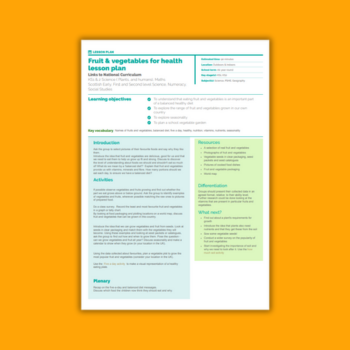Why your Early Years Staff Need to Know about Children’s Nutrition and Healthy Eating

If your team is lacking the skills they need to help children eat well, it’s time to invest in some CPD, says Lindsay Gilbert…

As a paediatric dietitian with a background in early years I’m often disappointed when I discover how many practitioners feel they lack the basic nutrition knowledge needed to help children eat well.
Whether it is around appropriate portion sizes or when to wean, how to encourage fussy eaters, guidelines around cup or bottle use, or recent recommendations on sugar or vitamin D, this lack of knowledge can have a serious impact on a child’s nutritional intake.
Not only this, but a lack of knowledge goes hand in hand with feelings of low confidence, making it much harder for practitioners to tackle nutrition-related issues effectively, incorporate and apply nutritional guidelines to menus or discuss any nutrition concerns with parents.
Statistics show that as many as 96% of the three- and four-year-old population are in some kind of formalised childcare (DfE), and the link between good nutrition in the early years and the prevention of long-term chronic diseases in later life is well established, so it has never been more important that children are supported to eat well by staff who have a good understanding of their basic nutritional needs and eating habits.
The EYFS and nutrition
Currently, childhood nutrition does not form a core component of the Level 2 Foundation Stage qualification for early years practitioners, meaning that those who do not progress further may have a low appreciation for the role that nutrition can have within the early years environment.
This is despite the fact that the EYFS explicitly states:
Where children are provided with meals, snacks and drinks, they must be healthy, balanced and nutritious […] Children must also be helped to understand the importance of physical activity, and to make healthy choices in relation to food. (3.74, 1.5)
This statement implies a certain level of understanding of the nutritional guidelines for under-fives, practical experience of menu design and the ability to help children learn about healthy eating.
However, a recent survey carried out by the Pre-school Learning Alliance showed that almost 80% of early years settings that provide food do not receive any external nutrition advice.
From my own experience working with hundreds of settings to implement the ‘Eat Better, Start Better’ guidelines, even those practitioners with good nutritional knowledge often struggle to apply these guidelines effectively, highlighting a risk that settings may not be able to meet the requirements of the EYFS as well as they might.
Fortunately, the Level 3 early years qualification does include childhood nutrition as a core component, but as the EYFS requires only a minimum of one member of staff per setting to have a Level 3 childcare qualification, this could potentially leave many settings with very few practitioners having any knowledge of childhood nutrition.
CPD – your obligations
Like any area within childcare, be it safeguarding or child development, regular CPD in nutrition is crucial to ensure staff are up to date with the latest advice and guidelines. However, unlike safeguarding, it is not considered mandatory.
Training obligations for providers are clear within the EYFS, which states that:
Providers must support staff to undertake appropriate training and professional development opportunities to ensure they offer quality learning and development experiences for children that continually improves. (3.20)
And the benefits to children are made explicit:
A well-qualified, skilled staff strongly increases the potential of any individual setting to deliver the best possible outcomes for children. (1.11)
However, many local authorities have stopped offering free CPD or have reduced their offer to cover mandatory training only. This particularly affects smaller settings and self-employed childminders with costs for formal training courses being seen as prohibitively expensive.
Getting cover during staff absence is also seen as another big barrier. However, there are ways to make your budget for CPD stretch a little further, and considering a ‘blended’ approach (where the focus is not solely on formal training but includes work-based training and support, mentoring or visiting other settings) may be more practical for many.
For example, online training is much more cost-effective than face-to-face training and resources such as Focus Games’ Foodtalk game can be used during team meetings or at twilight sessions to combat both cost and minimise the impact of staff absence.
Benefits for business
A recent survey highlighted that 93% of early years settings receive enquiries from prospective parents about the food they provide.
Whether it is about whether your menus meet the new recommendations on sugar, or how your setting manages children with food allergies, practitioners are often unsure about how to answer.
Providing your staff with up-to-date, evidence-based knowledge will allow them to confidently manage the often long list of nutritional queries that parents bring through the door, and parents definitely appreciate well-informed and knowledgeable staff who can manage parental concerns effectively.
It is not uncommon to hear managers say that they no longer have any issues around fussy eating at their setting after their staff have received nutrition training.
Providing nutrition training will also help staff understand how to meet the EYFS welfare requirements that meals, snacks and drinks should be “healthy, balanced and nutritious” because staff will have a good understanding of what that actually means in practice, and so be able to apply it.
This knowledge about food and nutrition can also be translated into learning activities that meet the EYFS areas of learning, eg physical development and understanding the world.
There may also be cost savings associated with less waste because portions of meals and snacks are more appropriate, or menus are more streamlined. And it isn’t just the children who benefit from a more confident and better informed workforce.
Staff have also reported that increased knowledge in nutrition has benefited their own families, with the ripple effect from nutrition training often leaving a legacy far greater than the original intended outcomes.
Seven ways to upskill your team
- Identify a key member of staff with an interest in nutrition who can be responsible for disseminating information to the rest of the team.
- Do a quick survey of your staff’s recent nutrition training.
- Review the training courses available against your setting’s particular needs. eg do your practitioners need a quick refresher or more in-depth information?
- Review your food policy, as this is the cornerstone of your setting’s whole approach to nutrition.
- Get creative about what counts as CPD.
- Maintain good practice networks (particularly important for smaller settings, eg childminders).
- Utilise staff induction and team meetings as opportunities for CPD.
Training options
Formal qualifications eg CACHE Level 2 award in promoting food safety and nutrition in early years and childcare settings.
Online training eg NDNA Level 2 Nutrition for Early Years.
Face-to-face training eg Action for Children ‘Eat Better, Start Better’ Voluntary Food and Drink Guidelines for England (online modules on Eat Better, Start Better will be available via the British Dietetic Association at letsgetcooking.org.uk) or NELFT Level 3 Early Years Nutrition.
Staff resources eg foodtalkgame.co.uk.
Lindsay Gilbert is an early years dietitian. For any further information, email Lindsay@foodtalk.org.uk. Browse resource ideas for Healthy Eating Week.











